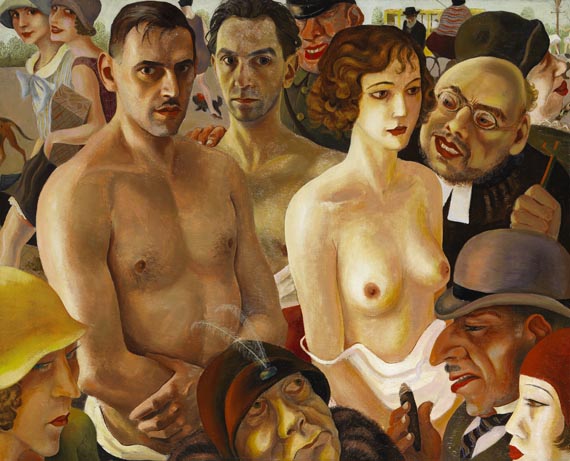
65
Richard Ziegler
Die Polizei, 1929.
Oil on canvas
Estimate:
€ 50,000 / $ 58,000 Sold:
€ 610,000 / $ 707,600 (incl. surcharge)
Oil on canvas
Monogrammed and dated lower left. 80,5 x 100 cm (31,6 x 39,3 in)
PROVENANCE: Private collection Southern Germany.
Richard Ziegler was born on May 3, 1891 in Pforzheim. He attended the secondary school and then went to Great Britain for a year. After he returned to Germany, Ziegler studied philology in Geneva, Greifswald, and Heidelberg. He received his doctorate in 1919. Though art played no important role in his studies, he decided to become a painter after his studies. Ziegler produced book illustrations, woodcuts, and oil paintings, settling in Berlin as a professional artist in 1925.
Richard Ziegler, who felt attracted by art at a later point in his life, achieved what others hardly managed even with taking several attempts: Within a short time only Richard Ziegler became part of the Berlin avant-garde, and showed works together with Dix and Grosz in the 'Novembergruppe'. Topics of his works from that era are similar to those of his contemporaries. The focus is on the social changes happening in connection with the end of the old order. Berlin, which had already been a place of drastic social contrasts before World War I, awoke again to a strange kind of bloom in the 1920s. Like no other place in Europe, Berlin was the center of avant-gardist activities in the mid-twenties. The social barriers were gone and the artists‘ depicted a demoralized society that refused to subject to any regulations. The three naked people in this work, surrounded by gazers, squares and indifferent people, represent a society without values on the one hand, on the other hand it is a society that is unable to overcome its bourgeois background. The naive innocence of the three nudes is exposed to the aggression of the petit bourgeoisie . The question as to who gets the upper hand remains open, Ziegler‘s ambivalent depiction leaves that to the observer.
When the Nazis came to power in 1933, he left Germany. Ziegler lived on the island of Korcula in Croatia until 1937. He attempted to deal with the political events in Germany in three series of monotypes. He lived in England from 1937 until the end of the war and went to Spain in 1963, where he produced his late expressive-realistic work. In his last years, Richard Ziegler returned to his hometown of Pforzheim. He died there on February 23, 1992, at the age of 101. [KD].
Monogrammed and dated lower left. 80,5 x 100 cm (31,6 x 39,3 in)
PROVENANCE: Private collection Southern Germany.
Richard Ziegler was born on May 3, 1891 in Pforzheim. He attended the secondary school and then went to Great Britain for a year. After he returned to Germany, Ziegler studied philology in Geneva, Greifswald, and Heidelberg. He received his doctorate in 1919. Though art played no important role in his studies, he decided to become a painter after his studies. Ziegler produced book illustrations, woodcuts, and oil paintings, settling in Berlin as a professional artist in 1925.
Richard Ziegler, who felt attracted by art at a later point in his life, achieved what others hardly managed even with taking several attempts: Within a short time only Richard Ziegler became part of the Berlin avant-garde, and showed works together with Dix and Grosz in the 'Novembergruppe'. Topics of his works from that era are similar to those of his contemporaries. The focus is on the social changes happening in connection with the end of the old order. Berlin, which had already been a place of drastic social contrasts before World War I, awoke again to a strange kind of bloom in the 1920s. Like no other place in Europe, Berlin was the center of avant-gardist activities in the mid-twenties. The social barriers were gone and the artists‘ depicted a demoralized society that refused to subject to any regulations. The three naked people in this work, surrounded by gazers, squares and indifferent people, represent a society without values on the one hand, on the other hand it is a society that is unable to overcome its bourgeois background. The naive innocence of the three nudes is exposed to the aggression of the petit bourgeoisie . The question as to who gets the upper hand remains open, Ziegler‘s ambivalent depiction leaves that to the observer.
When the Nazis came to power in 1933, he left Germany. Ziegler lived on the island of Korcula in Croatia until 1937. He attempted to deal with the political events in Germany in three series of monotypes. He lived in England from 1937 until the end of the war and went to Spain in 1963, where he produced his late expressive-realistic work. In his last years, Richard Ziegler returned to his hometown of Pforzheim. He died there on February 23, 1992, at the age of 101. [KD].
65
Richard Ziegler
Die Polizei, 1929.
Oil on canvas
Estimate:
€ 50,000 / $ 58,000 Sold:
€ 610,000 / $ 707,600 (incl. surcharge)
Headquarters
Joseph-Wild-Str. 18
81829 Munich
Phone: +49 89 55 244-0
Fax: +49 89 55 244-177
info@kettererkunst.de
Louisa von Saucken / Undine Schleifer
Holstenwall 5
20355 Hamburg
Phone: +49 40 37 49 61-0
Fax: +49 40 37 49 61-66
infohamburg@kettererkunst.de
Dr. Simone Wiechers / Nane Schlage
Fasanenstr. 70
10719 Berlin
Phone: +49 30 88 67 53-63
Fax: +49 30 88 67 56-43
infoberlin@kettererkunst.de
Cordula Lichtenberg
Gertrudenstraße 24-28
50667 Cologne
Phone: +49 221 510 908-15
infokoeln@kettererkunst.de
Hessen
Rhineland-Palatinate
Miriam Heß
Phone: +49 62 21 58 80-038
Fax: +49 62 21 58 80-595
infoheidelberg@kettererkunst.de
We will inform you in time.




 Lot 65
Lot 65 